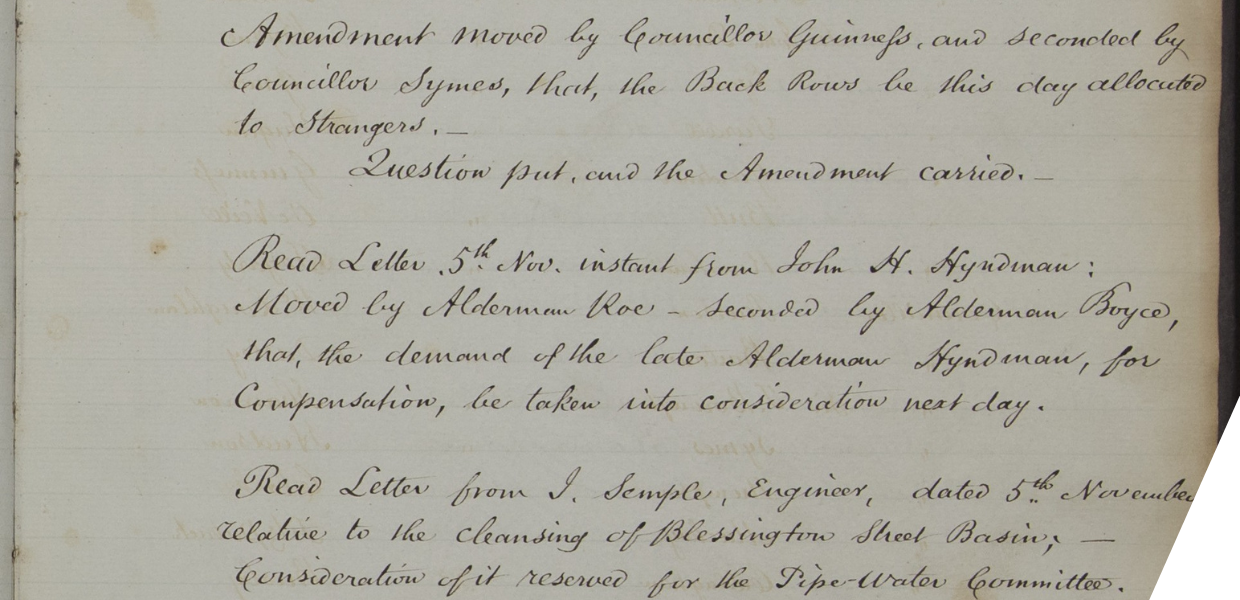Transcription Week and EnrichEuropeana+
Taking place from 28 March - 1 April 2022, Transcription Week aimed to unlock important historical documents and make them more easily available to historians, researchers, students and members of the public. The campaign focused on transcribing documents from two important collections held by Dublin City Library and Archive, the Wide Streets Commission, and Dublin City Council Manuscript Minutes. These covered almost two hundred years of Dublin’s history from 1695 to 1881, and the city’s transformation from a medieval city to the modern capital we know today. The handwritten records have been available up to now in hard copy or in some cases as digital photographs. However the text has not been easily accessible, and because of that, these important sources have not been as widely consulted as they could be.
This is something which the EnrichEuropeana+ project, which Transcription Week was run as part of, aims to address. The project is working to digitise these documents and make them available on Europeana, allowing them to then be transcribed during Transcribathon events via the Transcribathon.eu website platform. The resulting transcriptions can then be used to make improvements to the Transkribus automated transcription tool. Transcription Week was the first partner hosted transcription event of EnrichEuropeana+.
Adapting to an online format
We had originally planned to run a week-long set of in-person events and organise for groups of visitors from schools, historical societies and elsewhere, to visit an event space in our library headquarters. We hoped that they would take part in a two or three hour session with a training element and then undertake a few hours of transcription.
The COVID-19 pandemic changed that. As the pandemic and resulting restrictions continued we postponed the event twice and then decided that we needed to change our plan and stage Transcription Week as a fully online campaign.
We structured the campaign with a preparation week, where we released contextual and instructional videos and encouraged potential participants to register on Transcribathon.eu. This material was also packaged for secondary school history teachers so that they could familiarise their classes with the idea behind the project and get them ready to take part during Transcription Week itself.
During Preparation Week we also looked at ways to involve interested professionals from cultural heritage and academic institutions. We gave a guest lecture to the Department of Digital Arts and Humanities in University College Cork, presented the project to staff from cultural heritage institute members of the DRI, and promoted the events through special interest librarian mailing lists. This built on earlier work where we had organised a training run with library staff from Dublin City Libraries and interested colleagues from other institutions.
This outreach was important for disseminating the work and goals of the project, but each activity also increased the number of potential transcribers.
Launching Transcription Week
Transcription Week itself was launched with a webinar which we held daily throughout the whole week. While the pandemic obviously shaped our approaches, it didn't put an end to our trans-European collaboration. Thanks to the move online, we could still have our colleagues present during our webinars, take part in the transcription work and take notes on what worked and what didn’t for their own runs.
Our daily webinars were popular with participants. They were originally planned as ‘Transcribe along with us’ events where people could ask questions and get help with any issues they encountered. But they also gave us a friendly space to keep in touch, identify pain points which we could refer back to the technical team in Transcribathon and importantly to hold conversations with our transcribers. The feedback we received here will guide our work going forward.
Our call for participation had a generous response from the public and our volunteers transcribed over half a million characters in 842 different pages. They also geocoded about 1,000 locations in Dublin City centre, sometimes with single locations being mapped repeatedly over a number of decades as streets and buildings rose and fell. It was a great success!
What’s next?
‘Transcription Week’ has come and gone and we are now moving forward as the ‘Dublin Transcription Project’. We still have lots of material left to transcribe, and from discussions in our webinars and over email we know that our volunteers are interested in continuing to contribute. So we are reorganising. If ‘Transcription Week’ was a sprint then the ‘Dublin Transcription Project’ will be a marathon where we will pace things more sustainably. Instead of daily webinars we will host monthly online meetings which will incorporate guest talks from experts who can provide context on the collections being worked on.
If you’re interested in learning more you can sign up to Transcribathon.eu, or better yet sign up and take part in our ongoing work!



